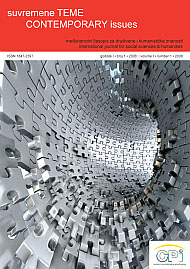The Post-Modern Society: Which are the Basic Value-Orientations?
The Post-Modern Society: Which are the Basic Value-Orientations?
Author(s): Jan-Erik Lane, Frank ReberSubject(s): Social Sciences
Published by: Centar za politološka istraživanja
Keywords: values; indicators; value orientation; social capital; egalitarianism; WVS; the independence hypothesis; post-materialism; gender; trust
Summary/Abstract: Political behaviour like voting ore allegiance to political parties is today less a function of the social structure and more an expression of the value orientations that the electorate harbours. The new research into political culture has resulted in numerous findings concerning the role of dominant value orientations like post-materialism, trust and gender or egalitarianism, as well as individualism. In this article, we examine a question never resolved in the political culture research, namely if the dominant value orientations are independent of each other or not. We show that this is really the case meaning that ordinary people have multiple value orientations, which increases the complexity of politics in the post-modern society. One really cannot speak of one set of values that would constitute the set of values for the post-modern society.
Journal: Suvremene teme : međunarodni časopis za društvene i humanističke znanosti.
- Issue Year: 2008
- Issue No: 1
- Page Range: 6 -20
- Page Count: 15
- Language: English

